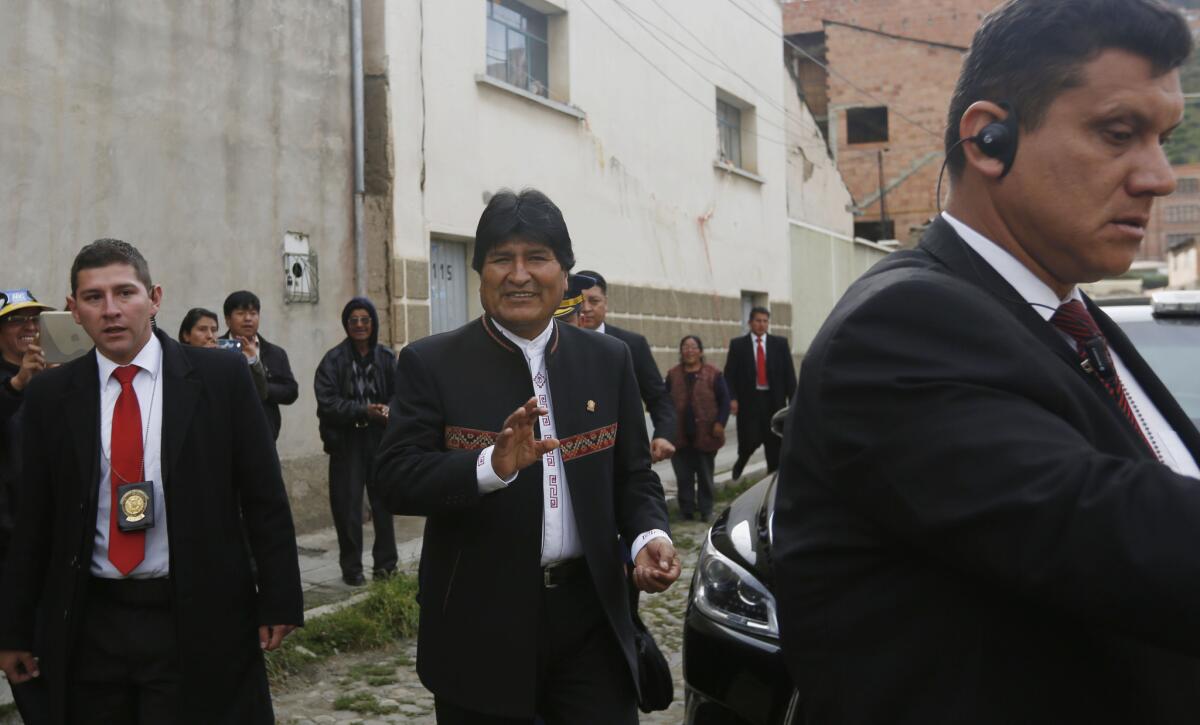Bolivian President Evo Morales discovers limits to his popularity

Bolivia’s President Evo Morales, center, in La Paz.
- Share via
Reporting from Bogota, Colombia — By many measures, things had been going well for Bolivian President Evo Morales.
Since he took office in 2006, the economy has averaged annual growth of 5%, and he has used revenue from mining and natural gas sales to build roads, schools and clinics, raise incomes and reduce the extreme poverty rate from 34% to 18%.
He easily won election to a third term in 2014, and as recently as last fall, his approval ratings topped 75%.
But there are limits to Morales’ popularity.
In a referendum Sunday, voters appear to have rejected his proposal to change the constitution to allow him to seek a fourth term that would start in 2020, after his current one ends. The votes were still being counted late Monday afternoon, but analysts said exit polls indicated that the measure had failed.
“Voters get tired and want a change once in awhile,” said Luis Eduardo Siles, deputy director of the Nationalist Revolutionary Movement, an opposition party. “That’s human nature.”
Experts also blamed plunging commodity prices and an influence-peddling scandal involving Morales’ former girlfriend, 27-year-old Gabriela Zapata, whose lack of a university degree has not prevented her from heading a Chinese-financed company that has received $500 million in government contracts. She and Morales have a child together.
Morales, a 56-year-old Aymara Indian and former head of a coca growers union, is the first indigenous president of a country where native peoples account for 62% of the population.
He came to power in the so-called pink wave that that saw voters in several Latin American countries rebel against the neo-liberal, market-oriented economic policies by electing leftist populists who promised to reduce inequality. It began in 1998 with the election of Hugo Chavez in Venezuela and continued with leaders in Brazil, Argentina and Ecuador.
Some experts said the referendum’s apparent defeat signaled growing disenchantment with that new generation of leaders.
Javier Corrales, a political science professor at Amherst College, said that Bolivian voters may be heeding the lessons of Venezuela, “where the population is suffering with a government they cannot change.” Chavez’s successor, Nicolas Maduro, is not scheduled to leave office until 2019.
NEWSLETTER: Get the day’s top headlines from Times Editor Davan Maharaj >>
John Youle, president of the Lima-based Consultandes, a risk analysis and crisis management consulting firm, said Morales’ attempt to extend his power is part of a long tradition of Latin American caudillos, a Spanish term for political strongmen.
“These authoritarian populists never know when it’s time to go,” Youle said. “Yes, it is good to be king, but they forget they are there not by divine right but on the basis of democratic elections.”
Morales’ recent dominance may have blinded him to the risks going into the referendum, analysts said.
“Continued political success at the polls likely made him a bit over-confident,” said Michael Shifter, president of Washington-based think tank Inter-American Dialogue. “But a decade is a long stretch in office.”
Besides the influence-peddling scandal, there were other indications of trouble. While Morales’ party, the Movement Toward Socialism, controls all branches of government, it suffered setbacks in local elections last year. And political opponents have accused Morales of mismanaging a fund aimed at helping indigenous communities.
The referendum result is likely to spur “serious internal turmoil” as Morales’ potential successors begin to jockey for position in the 2019 election, said Eduardo Gamarra, a political scientist at Florida International University.
An economic slowdown could aggravate the situation. Bolivia, which over the last decade has become a major exporter of natural gas, has yet to feel the full effect of declining commodities prices that have hurt economies across the region.
But its natural gas-supply contracts with Brazil and Argentina are set to expire this year and in all likelihood will be renegotiated at lower prices. That could leave less money for generous social welfare programs and the population increasingly dissatisfied.
Bolivians are tired of Morales’ “aggressive discourse in which anyone who disagrees with him is a sellout or Yankee lover,” said Siles, the opposition official.
Special correspondent Kraul is based in Bogota.
ALSO
A fast growing club: Countries that use drones for killing by remote control
Murder, torture, drugs: Cartel kingpin’s wife says that’s not the ‘El Chapo’ she knows
You think American politics are brutal? The EU debate in Britain is turning just as nasty
More to Read
Sign up for Essential California
The most important California stories and recommendations in your inbox every morning.
You may occasionally receive promotional content from the Los Angeles Times.









